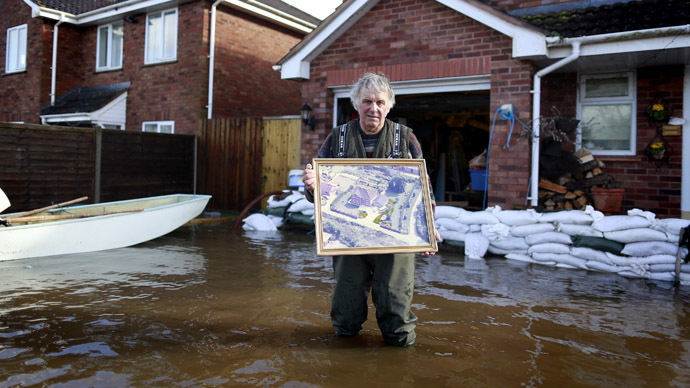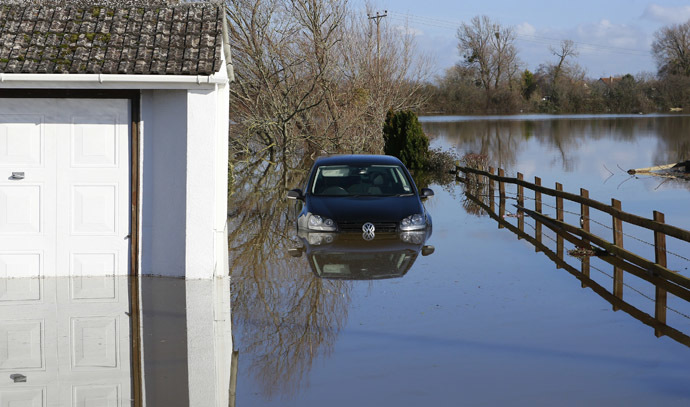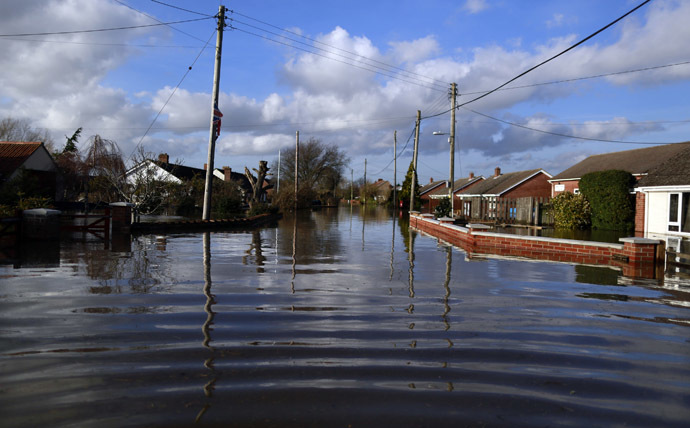All washed out: What floods reveal about UK political elite

The terrible impact that the ongoing floods have had over large parts of Britain - and the government response to the disaster - tells us much about the political system we now live under and in whose interests our government acts.
While it is true that January was Britain’s wettest winter month in nearly 250 years, the floods would not have caused the enormous damage and disruption that they have if successive governments in Britain had not cut back on flood defenses and put ‘free market’ dogma before protecting ordinary people from natural disasters.
Over 5,000 homes and businesses have been affected, rail services have been cut and thousands of roads closed. And the danger is far from over yet. At the time of writing severe flood warnings remain in place along the River Thames and in Somerset, a large county in south-western England.
It’s revealing to compare the attitude of the authorities in Britain to such matters in the pre-neoliberal era, to today. In 1974 work began on the Thames Flood barrier, to protect London from flooding. It was opened in 1982. It was a great engineering project-typical of the sort of work that public bodies undertook in the post-war era when our politics was more democratic. In recent years however flood protection has been very low down on the list of priorities for the government.
The Thatcher government, on an ideological mission to privatize and deregulate, started the rot by easing planning restrictions. That led to hundreds of thousands of houses being built on flood plains, a recipe for disaster at a time when climate change was leading to milder, wetter and stormier winters. The Labour government which came to power in 1997 did increase funding for flood protection but not by the amount that experts had called for.
A 2008 report by the National Audit Office found that 63 percent of Britain’s flood defenses were not being properly maintained. Meanwhile the building on flood plains increased - between 2001 and 2011 around 200,000 homes were built on flood plains in the UK.

Things got even worse when the current Conservative/Liberal Democrat Coalition came to power in 2010. They slashed funding on flood defenses by about 100 million pounds (US$167 million) a year and money given to the Environment Agency. Important schemes which were shelved included a 2.2 million pound plan to improve flood management on the River Parrett, which flows through the Somerset Levels, the area worst affected by the current floods.
“There is no excuse. In 2010 the coalition slashed spending on flood defenses when it should have gone up,” former Minister for Energy and Climate Change Chris Huhne admitted this week.
Not only did it cut spending, but the government has eased planning restrictions still further, meaning yet more building on flood plains. In November 2012, Planning Minister Nick Boles, a free-market zealot, called on the amount of Britain that was built on to be increased from 9 percent to 12 percent - equivalent to around 1,500 square miles (2,414 sq km) of open countryside being concreted over - but didn't say that the new developments wouldn't be on flood plains.
“[The government] are encouraging building on floodplains because what they are saying is ‘We need new houses for economic growth and by the time things flood we’ll have more money to cope with it,’” says Shaun Spiers, chief executive of the Campaign to Protect Rural England.
The tardy government response to the current crisis also speaks volumes about how seriously the government treats the problem. It took Prime Minister David Cameron all of six weeks to make his first visit to Somerset to see the damage. And even then he - unlike the Royal princes who helped with sandbagging - didn't visit the worst-affected village, Moorland. Environment Minister Owen Patterson only visited Somerset in late January, where he got an angry reception from locals as did the head of the Environment Agency, Lord Smith, a former Labour minister, who only visited on February 7.
It’s all rather reminiscent of the leisurely way that President Bush responded to the havoc caused by Hurricane Katrina in the USA in 2005. That showed us what his priorities were, and the government’s response to the flood crisis in Britain tells us the same about them.
Cameron, the man whose government has slashed spending on flood defenses and canceled crucial projects now tells us that ’money is no object’ to repair the damage from the floods. But money clearly was an object when it came to flood defense spending in 2010.
We don’t have to look far for an example of how things should be done: we only have to get on a ferry across the North Sea to The Netherlands.

“The difference in spending between the Netherlands and the UK shows the attitude the two nations have to flooding,” says Sunday Express City Editor Geoff Ho. “In the decade up to January 2013, total spending ondefenseson the east coast, in Lincolnshire Norfolk, Suffolk and Essex, came to 250 million pounds. Over the same period, the Dutch spent double that amount and are looking to spend more in the future.”
If only we could ‘go Dutch’ and invest the proper amounts, but our political elite isn't interested. Cameron has now pledged an extra 130 million pounds for flood defenses. But that is still a woefully inadequate amount given that the Environment Agency has said that we need around 500 million pounds a year to be spent just to maintain and repair existing infrastructure.
The trouble is that today, in the neoliberal era, politics is more about repaying rich party donors and special interest groups with policies that will benefit them, rather than spending money on things which would benefit ordinary people, and the country as a whole, such as flood defenses.
It was revealed in September 2011 that over half of the donations the Conservative Party had received came from individuals and businesses working in finance, with over a quarter of all its private donations coming from hedge funds, financiers and private equity companies. Overall, City funding of the Conservative Party has more than doubled since David Cameron became leader in 2005. That explains why the government’s priority has been ‘City friendly’ policies such as privatization and cutting the taxes of the richest 1 percent. And not protecting people in Somerset and elsewhere from flooding. With the Met Office warning that climate change is only going to increase the chances of extreme winter rainfall in the years ahead, we urgently need a change of politics.
I’m sure those Britons currently flooded out of their homes would much rather that we had a UK government which spent the proper amounts on flood defenses, instead of one which funds violent rebels in Syria, or which launches an expensive legal challenge to the EU‘s plans to cap bankers’ bonuses, but that‘s what our neoliberal political elite prefer to do with our money.
Until we get the radical, democratic reform of UK politics which is long overdue, we need to make sure we’re adequately stocked up with sandbags. And pray that it finally stops raining.
The statements, views and opinions expressed in this column are solely those of the author and do not necessarily represent those of RT.
The statements, views and opinions expressed in this column are solely those of the author and do not necessarily represent those of RT.













